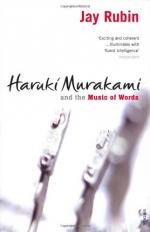|
This section contains 2,806 words (approx. 10 pages at 300 words per page) |

|
SOURCE: “A Simpler, More Physical Kind of Empathy,” in London Review of Books, Vol. 21, No. 19, September 30, 1999, pp. 22–23.
In the following review, Sage relates the common themes of South of the Border, West of the Sun and The Wind-Up Bird Chronicle to Murakami's general concern with defining a postmodern Japanese consciousness.
Talking to Jay McInerney in 1992, the year South of the Border, West of the Sun was published in Japanese, Haruki Murakami said that he wasn't so much an international writer, as a non-national writer: ‘You might call it the Japanese nature that remains only after you have thrown out, one after another, all those parts that are altogether too “Japanese.” That is what I really want to express.’ His pleasure in jettisoning the picturesque and traditional signs of ‘roots’ is of a piece with the fact that he was a fan of the work of Raymond Carver, and...
|
This section contains 2,806 words (approx. 10 pages at 300 words per page) |

|


